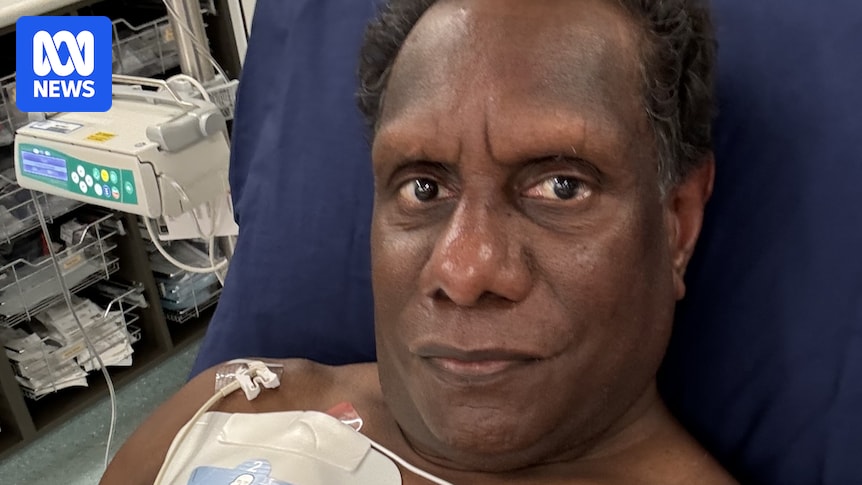On a warm Friday night in Dampier, a small town on WA’s Pilbara coast, Wickham Wolves captain Gavin Mippy was unknowingly about to play his last game of competitive football.
With more than five years of experience in the team, he was chosen as captain and ruckman in an evening clash with the Dampier Sharks.
Loading…
But it wasn’t long into the match when he pushed into the forward-50 area and suddenly collapsed to the ground, suffering a cardiac arrest.
His partner Cody Schlink recalls being on the sideline and rushing over to him as he lay lifeless on the field.
Gavin Mippy spent three weeks receiving treatment in Perth after his heart stopped. (Supplied: Gavin Mippy)
“I looked down at him and his tongue was hanging out of his mouth,” she said as her eyes began to well.
“I said to [the others who were assisting], he’s not breathing and … there was no pulse.”
Mr Mippy was clinically dead.
Cody Schlink says she kicked into nurse mode after Mr Mippy’s cardiact arrest. (ABC Pilbara: Alex Govan)
“There was no symptoms leading into this … it just happened so suddenly and quick … just blacking out,” he recalled.
Ms Schlink — who is a registered nurse — had just completed an advanced life support (ALS) course the day before the incident in WA’s capital, Perth, 1,500 kilometres away.
The course focused on cardiac arrest resuscitation.
Within one day of her training, she — alongside several club members and volunteer paramedics — cut through Mr Mippy’s match jersey and began to perform CPR.
Mr Mippy’s jersey was cut open so the defibrillator pads could be attached to his chest. (ABC Pilbara: Alex Govan)
“I remember going into nurse mode … I think all the ALS was coming back to me at that moment,” she said.
After eight minutes of performing CPR and one electric shock from a defibrillator, Mr Mippy was brought back to life.
“He just sat bolt upright, pulled his defibrillator patches off and was like, ‘I need to go play footy’,” she said.
Instead, he was rushed to hospital.
Coincidentally, it was Mr Mippy’s second cardiac arrest, with the first one happening 11 years ago to the day.
Quick response can save lives
According to the Heart Foundation, only between five and 10 per cent of people survive a cardiac arrest, but those odds are much higher if CPR or a defibrillator is administered quickly.
“This [cardiac arrest] has scared me so bad,” Mr Mippy said.
Three months on from the incident, the 50-year-old has stopped playing football and hopes to stay involved in the club in a coaching role or even as a water boy next season.
Mr Mippy has returned recently to Windy Ridge Oval after his cardiac arrest. (ABC Pilbara: Charlie McLean)
But for now, he wants others to understand the importance of being able to provide first aid and life support when faced with an emergency.
“I would like to try and get it out to the community … get people trained up,” he said.
“Any of these things could happen to anyone, anywhere, anytime, anyplace, whether you are unfit or fit.
“It could be a loved one, it could be a mate, it could be a stranger … it’s all about giving that person a second chance in life.”
Gavin Mippy (centre) with his partner Cody Schlink (second from left) and volunteer paramedics. (ABC Pilbara: Alex Govan)
Ms Schlink is also advocating for greater knowledge about CPR.
“I just think that it’s really important for people within the community to learn CPR, learn first aid and learn how to use a defibrillator,” she said.
“There’s defibrillators around, but nobody knows how to use them … in a timely manner.
“It’s the difference between life and death.”
